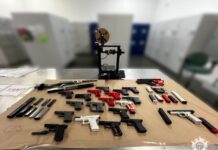
Photo by Chandra Bodalia
BY RATTAN MALL
PEACE for now on the gang front – and hopefully it’s not the proverbial calm before the storm.
Sgt. Lindsey Houghton of the Combined Forces Special Enforcement Unit – BC (CFSEU-BC), the province’s anti-gang unit, told The VOICE this week that in the lead up to Christmas we typically see fewer incidents of gang violence.
He also noted: “We’ve seen fewer incidents this year in terms of gang-related murders and gang-related attempted murders.”
Houghton added: “So that’s, of course, a very positive thing, but we know January and February statistics have historically picked up and sometimes significantly. So we are very well aware of that and we continue to work to make sure that that does not happen at the start of 2015.”
He said: “There’s always gang members out there doing their criminal activity and looking to take each other out and we continually suppress their activities, disrupt their activities and work with our policing partners in every corner of the province to make sure that they are not successful in what they are planning or what they want to do.”
 I asked Houghton, who VOICE readers are now very familiar with, if any crime group was trying to fill the gap created by the Red Scorpions.
I asked Houghton, who VOICE readers are now very familiar with, if any crime group was trying to fill the gap created by the Red Scorpions.
Last October, B.C. Supreme Court Justice Catherine Wedge found two Red Scorpion gangsters Cody Haevischer and Matthew Johnston each guilty of six counts of first-degree murder and one count of conspiracy to commit murder in the 2007 Surrey Six murders.
Surrey Six co-accused Jamie Bacon, who is incarcerated, is being tried separately. He is charged with first-degree murder in the death of Corey Lal and, along with Haevischer and Johnston, conspiracy to commit murder in Lal’s death.
His brother Jonathan’s murder trial will start in April 2016 in Kelowna. The accused are Jujhar Khun-Khun, Michael Jones and Jason McBride. Jonathan was killed in Kelowna on August 14, 2011. Bacon, Larry Amero, a full-patch Hells Angels member, James Riach of the Independent Soldiers and two women were injured in the gangland shooting.

The third brother, Jarrod Bacon, has been serving a 14-year prison sentence for conspiring to import cocaine into Canada from Mexico.
Houghton pointed out: “At the start of 2014, in the absence of Jamie and Jarrod (both being in custody), Matthew Campbell was the de facto leader of the Red Scorpions on the outside and he was murdered in Abbotsford and so the number of high-ranking, if you will, Red Scorpions who are out on the streets are fewer now than they were this time last year.”
Houghton noted that when the top people in any gang are killed or jailed, “there are people in the middle and other parts of the organization who want to try and fill that gap.”
He added: “Many of them are not successful because they don’t have the internal credibility or the credibility amongst their peers or on the streets nor do they have the “muscle” behind them to fill those gaps.”
Houghton said what happens then is that the group will simply dissolve or break apart and the members will form alliances or small cells and so on.
So has that happened with the Red Scorpions?
Houghton replied: “Yes, it’s happened with the Red Scorpions. It’s happened with groups like the United Nations where at their height they had close to 200 members and now a great number of them are dead or in jail or on the run, or have died from overdoses or other reasons, or they’ve left. Whatever it is, their numbers are a very small fraction of what they used to be – and some of those people who were involved with them back then are now involved in other groups or simply not involved at all.”
SO which is the dominant group right now in the Lower Mainland?

Houghton replied: “There is no one dominant group and that’s the continual fight between all of these groups. We have sort of this motley crew of gang alliances – you have groups like the “856”, you have groups like the Red Scorpions and their spin-offs, there are still members of the Independent Soldiers around, there are still members of the Dhak group around and their cells and the Duhre side of things, and the United Nations.”
I asked him if the Dhak-Duhre group was still active and he pointed out: “I think it’s fair to say that the Dhak-Duhre group no longer exists because the Dhak brothers no longer exist and Dip [Sandip] Duhre no longer exists; so historically, we can certainly call them that and refer to them as that, but the workers, if you will, … have all scattered to form either their own small cells or align themselves with others who they may have been friendly with back at the later stages a few years ago.”

He added: “Many of them still continue their criminal business and still continue on that business that was started when they were still part of the “Dhak-Duhre” group. But I think it’s fair to say we can move on from calling them that because Duhre and the Dhak brothers are no longer with us.”
I asked Houghton about any new strategies that the CFSEU-BC was planning and he noted: “We continue to evolve our disruption and suppression strategies and our prevention strategies like the “End Gang Life” campaign (www.endganglife.ca) and 2015 will see a number of new products come out related to that and those work hand-in-glove with our suppression and our enforcement strategies.”
He said: “We now make a very concerted effort to have face-to-face talks with gang members and those people who are either committing or we know are going to commit or are somehow involved in violence on our streets and communities around the province. That was not something that was necessarily done years ago and it’s something that we are doing now because we recognize that we need to go about changing behaviour, not just take their guns away from them or their drugs, but we need to get to the root causes of their behaviour.
“And so we are meeting with them before they get out of prison or meeting with them after they get out of prison or meeting with their families or talking to their parents. We are going and knocking on their door whenever we can just to say ‘hi’ and just to remind them that we are a part of their life if they choose to continue this behaviour.”
The CFSEU-BC has been pursuing this for the past year and a half and will continue to do so in 2015. Houghton said: “We have intensified those efforts over the last year and those will continue to be intensified over the foreseeable future.”












